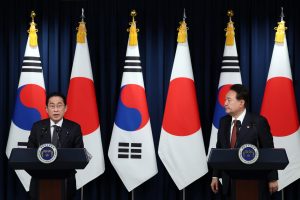The relationship between Japan and South Korea has strengthened in recent years. Since taking office in May 2022, South Korean President Yoon Suk-yeol has dedicated considerable efforts to thawing tensions with Tokyo that were exacerbated during his predecessor’s reign. Under former South Korean President Moon Jae-in, bilateral ties between the two states deteriorated to what many considered its lowest point in several decades.
As a gesture of renewed solidarity, Yoon and Japanese Prime Minister Kishida Fumio have met a record-breaking nine times since last March. The two have agreed on robust policies involving defense, commerce, diplomacy, and national security. Likewise, cultural exchanges and tourism have swiftly rebounded to pre-COVID-19 levels.
Nevertheless, despite the reduced hostility, mutual perceptions within the respective countries have shown little change. A significant portion of South Koreans still perceive Japan as an illiberal and militaristic state, while Japan continues to view its neighbor as a volatile partner.
In an interview with The Diplomat, Dr. Choi Eunmi deciphered the causes of this lingering distrust and proposed strategies to forestall deterioration in the future. Dr. Choi is a researcher at the Asan Institute for Policy Studies and a member of the Ministry of National Defense’s policy advisory committee.
How has Japan and South Korea’s relationship evolved, and what factors have contributed to these changes?
Under the preceding Moon administration, bilateral relations between Japan and South Korea reached a nadir with heightened diplomatic tensions and strained interactions. During this period, there was a notable reluctance among South Koreans to visit Japan and patronize Japanese establishments due to the widespread anti-Japanese sentiment. Conversely, Japan viewed South Korea with apprehension, perceiving it as an unstable partner.
Such a fraught relationship is detrimental to any nation. Fortunately, we have moved beyond this combative phase.
A breakthrough occurred when the Yoon administration proposed a third-party settlement plan to end the longstanding wartime forced labor dispute. Despite much opposition within Korea, Seoul has chosen no longer to elevate this issue to a diplomatic impasse with Japan. Tokyo, though not overly enthusiastic, also acquiesced.
Why hasn’t anti-Japanese sentiment persisted under the new leadership?
Let’s observe why such sentiment flourished in the first place. I think the Japanese government was unjustified in its unwarranted attack on our semiconductor industry – a crucial sector and a source of national pride. Tokyo’s decision to remove South Korea from the export whitelist stemmed largely from diplomatic contention surrounding the forced labor dispute.
In response, South Korea also misstepped. While it was the public that initiated anti-Japan protests, the Moon government’s actions stirred nationalistic sentiment that further exacerbated the animosity.
This landscape has shifted. Consider the recent Line-Yahoo incident, a controversy that could have easily strained our relationships again. But from the outset, the Yoon administration clarified that they would not escalate it into a diplomatic spat. Such effort is also evident in the South Korean government’s response to the Fukushima Daiichi treated water discharge from Japan.
So why have perceptions remained unchanged?
As detailed in my recent report, mutual perceptions have seen minimal improvement over the years. For Koreans, negative sentiment [toward Japan] originates from historical and territorial disputes with Japan. In the same vein, although K-culture has brought about many positive changes for the Japanese, they still harbor negative images of South Korea.
One contributing factor is Japan’s inadequate public diplomacy vis-a-vis South Korea. After World War II, Japan extensively tried to rebrand itself as a pacifist state, but these endeavors have mainly resonated with the United States and other nations. Japan’s public diplomacy initiatives in South Korea were sporadic and only gained momentum in the 2000s.
Another factor is Japan’s cultivation of “pro-Japanese” (chinilpa) individuals and intellectuals within South Korean society, which has further fueled anti-Japan sentiments.
The shared problem is that neither country sufficiently sought to convince its citizens of the importance of its neighbor. Many ordinary citizens in each country still wonder just why the two states must remain close allies.
What can the two countries do to fix this?
First, both governments must continue to persuade their citizens that fostering a positive relationship is in their national interest. Second, civilian-level exchanges should be increased, particularly among the middle-aged population. Expert conferences should also be held more frequently for individuals in their 30s and 40s.
Personally, I believe the South Korean government has taken every measure to prevent diplomatic issues from souring Seoul-Tokyo ties. The future will ultimately hinge on Japan’s reaction. One area where Japan could improve is by seeking a deeper emotional understanding of South Korea beyond practical considerations. For instance, I hope Prime Minister Kishida continues to visit the Korean Atomic Bomb Victims Cenotaph, as he did with President Yoon during the Hiroshima G-7 Summit.
How should the two prepare for Donald Trump’s potential return to the U.S. presidency?
The basic pillars of the Seoul-Washington-Tokyo security and economic framework are unlikely to change under Trump 2.0. However, the U.S. may reduce trilateral military exercises while pressuring its allies for increased defense spending. South Korea and Japan, therefore, must enhance their strategic communication and address these issues hand in hand.

































